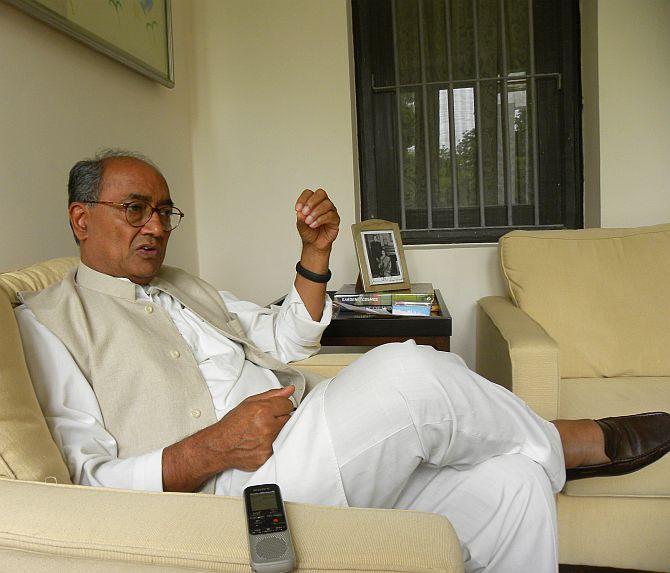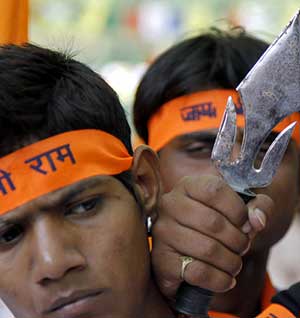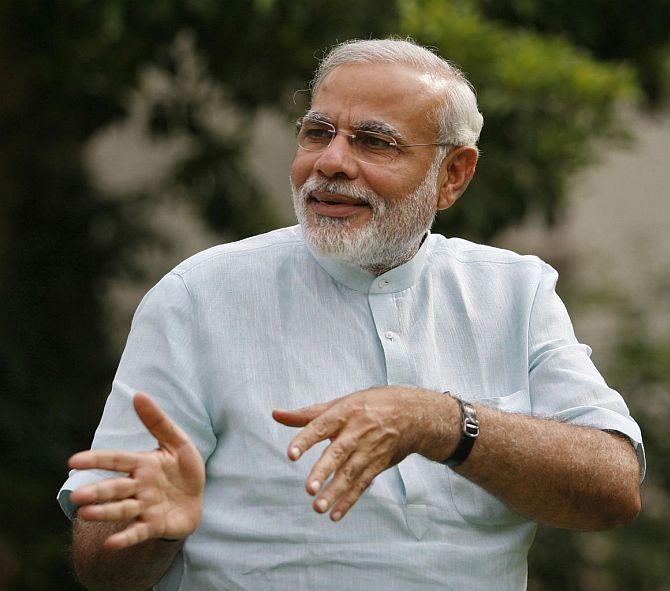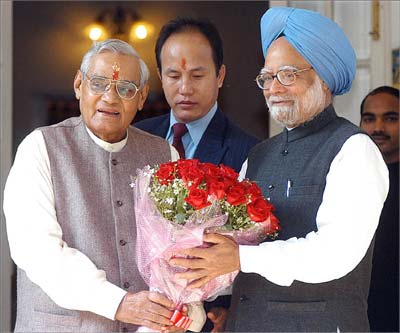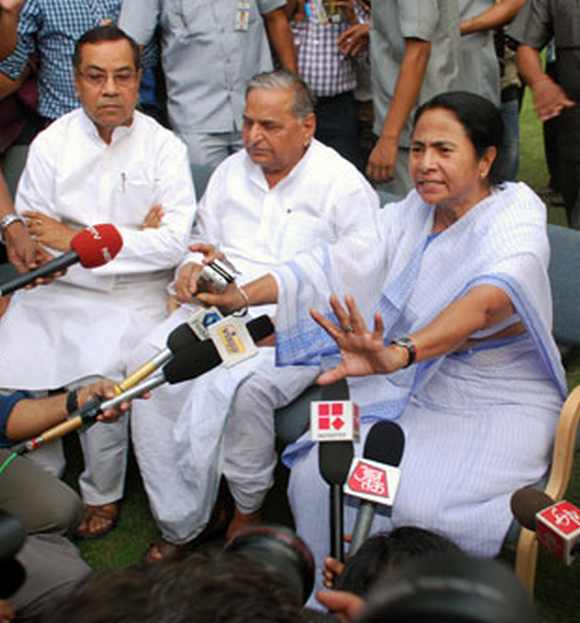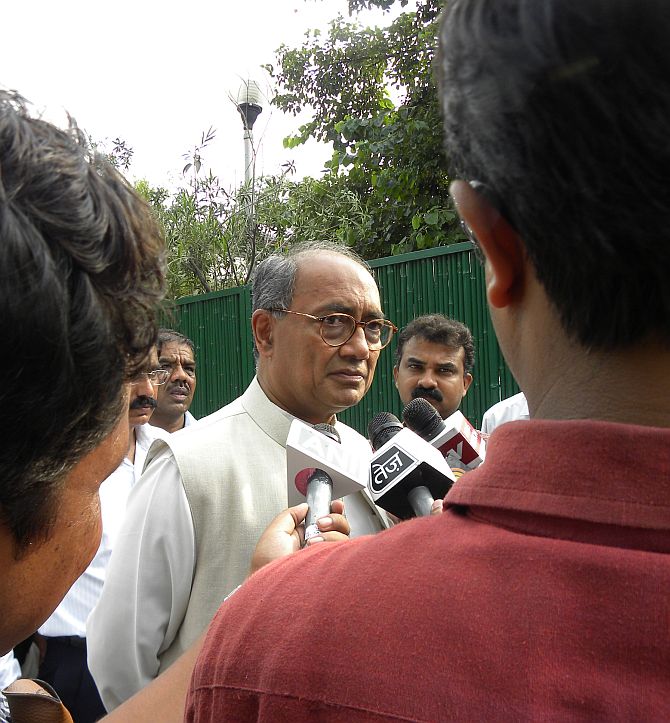 | « Back to article | Print this article |
'There is no religion such as the Hindu religion'
A bunch of coffee table books on India are the only decorative items in the room apart from a signed black and white picture of Rajiv and Sonia Gandhi on the side table at his elbow.
At Digvijaya Singh's side is a visiting card that sports a holographic image of Sonia Gandhi against the Congress colours, that shimmers in the afternoon sun.
On his wrist the Congress general secretary wears a black health band. No religious red threads are visible although he returned from a pilgrimage to Pandharpur some days earlier. He visits Pandharpur, Maharashtra, faithfully every year for the MahaPuja of Lord Vitthala and Rukmini for Ashadhi Ekadashi.
Chai and cold drinks are going around, along with cheese toasts, biscuits and sev-bhujia.
Please click here if you haven't read the first part of Vaihayasi Pande Daniel's interview with Digivjaya Singh.
Ab aage...
What is your own brand of Hinduism?
Don't you agree that it is easy for Hindus to be secular because we don't have to constantly prove our loyalty to the country?
Digvijaya Singh: To me religion means a personal belief, which affects my life and my lifestyle; what has been taught to me by my parents and what I think should be my behaviour or my dealings with people of other religions.
There is no religion such as the Hindu religion.
Our religion is Sanatan Dharm (a religion which eternally exists in God, which is revealed by God, which describes the names, forms, virtues and the abodes of God, and which reveals the true path of God realisation for all the souls is called Sanatan Dharm, the universal religion for the whole world according to the Vedic foundation Web site).
A person who is a devotee of Sanatan Dharm has to be respectful towards all religions.
All religions teach us the same thing.
Please click NEXT to read further...
'I can't call myself a Hindu nationalist or nationalist Hindu'
It is religious fundamentalism which sort of distorts the definition and ethos of every religion.
Be it Sanatan Dharm. Or Islam or Christianity or Sikhism, Buddhism or Jainism.
They give us the essence of what a person should do in his life. And therefore it has to be understood in the right perspective.
When you start running down some other religion and say my religion is the best that brings in the issue of religious fundamentalism, which does not really work in the overall approach to religion.
I, for one, have always fought with religious fundamentalism -- whether it is Hindu fundamentalism or Muslim fundamentalism or Sikh or Christian fundamentalism.
The Congress party stands by its belief of equal respect to all religions.
What about this remark about burqa secularism (Narendra Modi told a meeting in Pune in July that the Congress hides behind the burqa of secularism)?
Digvijaya Singh: When you start equating nationalism with religion, it is not correct.
We are all nationalists, whether we are Hindus or Muslims or Sikhs or Christians.
But I cannot call myself a Hindu nationalist or nationalist Hindu.
Because nationalism is for the whole country, for the whole State. Religion is my personal belief.
I can't impose my personal belief on the nation. That is the difference between countries that have a State religion. Pakistan is a country which has Islam as its State religion.
The peacock starts knocking again...
Digvijaya Singh:
We chose to be a secular country, where every religion would be treated on the same footing.
If you see what is happening in Pakistan today, Islamic fundamentalists have created a situation where Pakistan is almost a failed State now.
Here in India we adopted -- Pandit Jawaharlal Nehru, Mahatma Gandhi, Sardar Vallabhbhai Patel adopted -- a secular status for the country, where we respect all religions. And therefore our democracy has survived in this country.
Digvijaya Singh's conversation sometimes sounds like it escaped from a Congress manifesto.
There are ample references to Jawaharlal Nehru, Mahatma Gandhi, Rajiv Gandhi, Indira Gandhi.
His face never shows irritation or surprise. It is a bland mask of smiling, imperturbable charm.
Born in 1947, a few months before Independence, in Indore, in the Central Provinces and Berar, Singh is the same age as India.
An engineer by training, he joined politics at 22 when he was elected to the Raghogarh Municipal Council in 1969 in Guna district, Madhya Pradesh.
His son Jai Vardhan, who just finished an MBA in rural development from Columbia University, has joined politics at roughly the same age from the pocket borough or thikana of Raghogarh and may contest this winter's state assembly election.
As Congress general secretary, the articulate, social media savvy, Singh is very accessible. He is prompt in answering texts; they are all signed Digvijaya -- "I spend at least one hour every morning going through them," he explains.
He calls himself everyone's "favourite punching bag." The Internet is rife with sites like 'Digvijay Singh (most faithful dog of congress)' or 'I hate digvijay singh.'
He tells you, after some thought, that for him politics is business with people. "People are solutions," he says. "Not problems. And that for him, it is the people who matter."
Singh believes that the best politics and governance occurs when politicians are responsive to people's needs and the people or, as he call them, "the stakeholders" are involved, which he says is "seldom."
Please click NEXT to read further...
'Raj Dharm is where fundamentally Modi has gone wrong'
Do you believe Narendra Modi had some involvement in what happened in Gujarat during the riots of 2002?
Digvijaya Singh: The very fact that he did not sort of intervene and did not direct the Gujarat police to curb the activists who went on a rampage, killing innocent Mus... (He pauses carefully) Muslims, I think he sort of did not act as a good chief minister and this is what Atal Bihari Vajpayee said.
That you did not follow the Raj Dharma.
What is Raj Dharm? Raj Dharm means that you have to protect every citizen. And that is where fundamentally (Modi) has gone wrong.
I am not sure if he is responsible. But he is certainly accountable for what happened.
I was the chief minister in Madhya Pradesh when this thing (the Gujarat riots) happened.
Godhra was closer to Ratlam (in the western Malwa region of MP) than to Ahmedabad.
I made sure that although Ratlam had a very, very sensitive communal history, not a single incident of a communal nature took place in Ratlam, and even in Jhabua (the former princely state in western MP).
Hordes and hordes of people were sent from Gujarat to kill Muslims in the hinterland of Jhabua. But we actively deployed our forces.
My Congress people also worked. And they did not allow any kind of harm to come to the Muslims in that area.
Do you think Mr Modi has since made any acceptable noises to show that he feels some guilt for the accountability he did not deliver?
Digivijaya Singh: Narendra Modi has a mind of his own. His actions and his speeches have always had a communal colour.
I think one would be expecting too much from him, to even expect any kind of remorse from Modi as far as the Gujarat riots are concerned.
Please click NEXT to read further...
'Modi's actions and speeches have always had a communal colour'
what are the greatest challenges confronting the next government?
Digvijaya Singh: The biggest challenge confronting the next government is, of course, creating an environment of investment in the country, number one, which creates more employment.
Bring in the skill development, so that when people come to an age where they can be trained to find employment for themselves.
Then there are, of course, social challenges.
We are way down in our social indicators, the human development index. So therefore we have to look at the malnutrition, anemic pregnant mothers, pregnant people above the poverty line.
Then we have the challenge of the utilisation of our natural resources.
We have to develop more infrastructure, roads, railways, ports and airports. These are the major challenges we look at.
Of course, one of the major political challenge is to fight the ideology of fundamentalism, the ideology of hate and communal violence, so we have peace in India, with communal harmony.
We have right wing extremism, which breeds on religious fundamentalism.
We have left wing extremism also.
We have to create an environment of trust and confidence among the tribals, particularly among the forest dwellers in the Naxalite areas.
Please click NEXT to read further...
'Tell me one path-breaking decision that Vajpayee took'
What are your beliefs, apart from religion?
Digvijaya Singh: We are a country with a lot of promise. Because of the right policies that we followed from Pandit Jawaharlal Nehru to Sonia Gandhi, the Congress party has taken decisions for the public good, keeping (abreast with) the changing times.
It was Pandit Nehru who brought in land reforms. He distributed land to millions of people without bloodshed. Otherwise, in a revolution there would have been bloodshed.
We had a blood-less coup in the rural areas where big landlords left their land and gave it to the poor people. That itself is a big achievement.
Then, of course, he built the infrastructure for development, developed institutions like, for example, big hydro projects, BHEL, ONGC, SAIL, all these big public sectors which are doing extremely well now.
At the same time he built institutions like the IITs.
Mrs Gandhi built the IIMs. Therefore, he (Nehru) brought in the scientific temper in the education.
Then Mrs Gandhi brought in the nationalisation of banks because of which we could face the global economic crisis.
And then, of course, Rajiv Gandhi brought in the computer.
All of them were criticised when they took (their) decisions, but now in hindsight we can say they were the right decisions taken at the right time.
But you are not giving any credit to Atal Bihari Vajpayee.
Vajpayee just followed what was decided. Tell me one path-breaking decision that he took.
Pandit Nehru had said he is the right man in the wrong party. But he (Vajpayee) did not take any decision which you could say were path-breaking.
But he held the country together which in India is a huge task!
Accepted. But when you are talking about path-breaking decisions taken by stalwarts, there is nothing you can credit him for.
The nuclear tests of 1998?
That was not his doing.
It was first Indira Gandhi in Pokhran! (India conducted its first nuclear test on May 11, 1974 when Indira Gandhi was prime minister.)
Please click NEXT to read further...
'A Third Front experiment has not really worked in this country'
Do you think there will be a Third Front government after the next election?
Could we have another period of political uncertainty like we had in the 1990s?
Digvijaya Singh: I don't think so. A Third Front experiment has not really worked in this country.
I always tell people that the tail cannot move the body.
It is the body which has to move the tail.
Do you think we are headed for some period of uncertainty?
Digvijaya Singh: I don't think so. We are a mature democratic country. And the decision in 2014 would also be a decisive mandate.
Please click NEXT to read further...
The Congress's top spin machine, DJ Singh, in action...
Outside, scores of panting television crews are waiting for Digvijaya Singh's daily fare of television rating boosting bytes.
In seconds he is surrounded by a frenzied throng. He stops to say he does not have much time today, but promises a few minutes.
He is probably headed to the meeting of 200 party spokespersons of the state Congress units, convened by Rahul Gandhi.
Calmly, ever so reasonably, skillfully, before getting into a white Ambassador and pulling away, over three minutes, he runs, rapid fire, through a clutch of diverse questions, ranging from the power situation in Madhya Pradesh, how Muslims are being pushed to the fringes in Gujarat, the origins of terrorism, Arun Jaitley's remark that the Congress is trying to communalise Election 2014...
...The Congress's top spin machine, DJ Singh is in action...
..."Jitni bijli mere samay milti thee, aaj bhi gaon mein mil rahi hai... (Villages are still getting the same amount of electricity that they used to get during my tenure (as Madhya Pradesh chief minister)
...Atalji jaise vyakti ka naam aaj badnaam ho raha hai... (The reputation of someone like Atal Bihari Vajpayee is being tarnished)
...Yeh koi nayee baat nahin hai... Bharatiya Janata Party ki soch aur vichar... Hamesha unho ne baat kar rajneeti karne ka prayas kiya hai... (There is nothing new in this... BJP's thoughts and beliefs... They have always tried to indulge in divisive politics...)
... Atankivad ki jarh religious fundamentalism hai... (Religious fundamentalism is the root cause of terrorism)
... Arun Jaitley should ask this question of his mentor...
